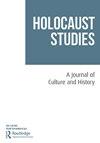Jewish refugees who fled Europe via Franco’s Spain: coping with insufficient food in the concentration camp of Miranda de Ebro
IF 1
Q1 Arts and Humanities
引用次数: 0
Abstract
ABSTRACT Between 1940 and 1944, thousands of persecuted Jews fled Europe via the Iberian Peninsula. For men, a defining feature of this escape was feeling hungry for several months in a Spanish detention camp, the “campo de concentración de Miranda de Ebro.” There, the men developed coping strategies for acquiring additional food, and tactics for coping psychologically with the hunger. These strategies created bonds and stable groups; conferred a sense of agency; and made the men feel useful, valued, and cared for. In parallel, Allied country diplomatic representatives, Red Cross organizations, and American relief agencies provided food parcels.经由佛朗哥统治下的西班牙逃离欧洲的犹太难民:应对米兰达·德·埃布罗集中营食物不足的问题
1940年至1944年间,成千上万受迫害的犹太人经由伊比利亚半岛逃离欧洲。对于男人来说,这次逃亡的一个主要特点是在西班牙拘留营“concentración de Miranda de Ebro”中挨饿几个月。在那里,这些人制定了获取额外食物的应对策略,以及在心理上应对饥饿的策略。这些策略建立了联系和稳定的群体;被赋予能动性的;让男人觉得自己有用,被重视,被关心。与此同时,盟国外交代表、红十字会组织和美国救济机构提供了食品包裹。
本文章由计算机程序翻译,如有差异,请以英文原文为准。
求助全文
约1分钟内获得全文
求助全文

 求助内容:
求助内容: 应助结果提醒方式:
应助结果提醒方式:


